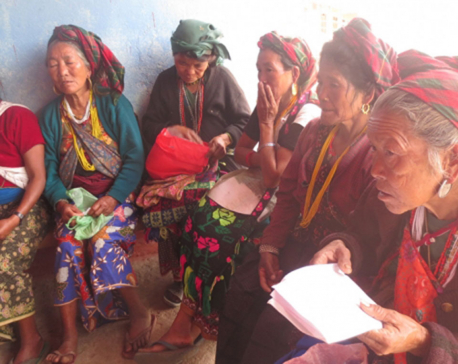
OR
Finalize laws before recommending names for transitional justice bodies: Conflict victims
Published On: May 27, 2019 08:10 AM NPT By: Republica | @RepublicaNepal
KATHMANDU, May 27: The recommendation committee formed to suggest new names for the chairs and commissioners of the two crucial transitional justice (TJ) bodies is in a fix following stern warning from the conflict victims that they would not accept the new commissioners if their concerns were not addressed.
The conflict victims have stated that the decision of the recommendation committee will be unacceptable to them if it decides on the matter unilaterally.
Under pressure from the conflict victims, the recommendation committee has been prolonging its scheduled date to suggest new names for the two TJ bodies—Truth and Reconciliation Commission (TRC) and the Commission for Investigation on Enforced Disappeared Persons (CIEDP).
The committee headed by former Chief Justice Om Prakash Mishra was scheduled to announce nominees for chairs on Thursday but postponed it for Tuesday after Mishra left the country for a few days.
“Our chief is out of the country. So, the next meeting will take place only on Tuesday. We cannot say anything before that,” said Sharmila Karki, a member of the recommendation committee.
Karki said the committee is facing some difficulties in recommending the chairs and members of the TJ bodies after the conflict victims continued to pile pressure on them not to recommend the officials without finalizing the TJ-related laws.
“They want the laws promulgated before naming the officials although we think that the TJ process will begin only after the officials are recommended,” said Karki.
At a function organized on Sunday, the Conflict Victims’ Common Platform (CVCP) members had reportedly warned the recommendation committee members not to recommend the names for the TJ bodies right now.
According to sources privy to the matter, the victims waned of boycotting the TJ process if the officials were recommended or appointed without finalizing the laws concerned.
“Let it be known that if the former TRC and CIEDP commissioners (who themselves were responsible for the failure of the two commissions) are reappointed, the conflict victims will reject the commissioners outright,” the CVCP said in its special resolution endorsed by the executive committee, adding, “We reiterate that the repetition of the same commissioners will force us to boycott the commissions.”
The victims’ group has expressed its displeasure at the committee saying the committee has not been transparent in its work. The group accuses the committee of functioning under the influence of political parties.
“We therefore call on the members of the recommendation committee to correct their course and recommend competent, impartial, independent and respected experts,” said the group.
Even though 12 years have elapsed since the government promised to settle the conflict-era cases, as many as 65,000 complaints registered with the TJ bodies remain unresolved. The conflict victims are waiting for justices since years.
The TJ process, however, is at the crossroads after members of both the TJ bodies retired in mid-April following the government’s decision to discontinue their stay at office despite a year-long term extension of the commissions.
Established in February 2015, both the TJ bodies were mandated to complete investigations into conflict-era cases and ensure justice to the victims within two years. The government extended their tenure by two more years to complete the given tasks. More than 61,000 cases have been filed at the TRC. Of them, the TRC has concluded preliminary investigations into about 3,000 cases.
The government, which extended the term of both the TJ bodies by a year in the last week of February, however, extended the terms of the commissioners just for three months, giving them the marching orders.
Dismayed at the lack of progress made by the TJ bodies, the government wants to reconstitute the commissions. But the recommendation committee itself has landed in trouble after the conflict victims opposed the process of recommendation.
You May Like This

Panel moves to recommend TJ officials amid widespread criticism
KATHMANDU, Nov 24: A recommendation committee is preparing a final list of candidates for leading the Transitional Justice (TJ) bodies.... Read More...

Govt trying to bring derailed TJ process back on track
KATHMANDU, Sept 13: In a bid to bring the derailed transitional justice (TJ) process back on track, the government is... Read More...

TJ bodies spent Rs 460 million in four years, conflict victims still await justice
KATHMANDU, April 13: The members of two crucial transitional justice (TJ) bodies spent nearly Rs 460 million during their four... Read More...



Just In
- By-elections: Silence period starts from today, campaigning prohibited
- A Room of One's Own- Creative Writing Workshop for Queer Youth
- Tattva Farms rejuvenates Nepali kitchens with flavored jaggery
- Evidence-Based Policy Making in Nepal: Challenges and the Way Forward
- Insurers stop settling insurance claims after they fail to get subsidies from government
- Nepal-Qatar Relations: Prioritize promoting interests of Nepali migrant workers
- Health ministry to conduct ‘search and vaccinate’ campaign on May 13
- Indian customs releases trucks carrying Nepali tea, halted across Kakarbhitta














Leave A Comment